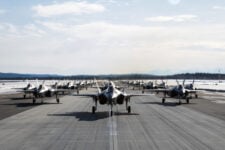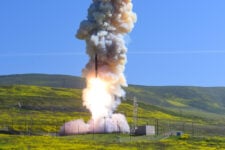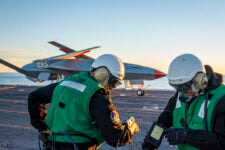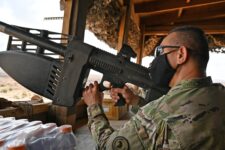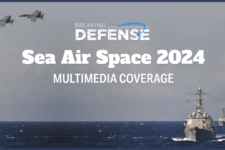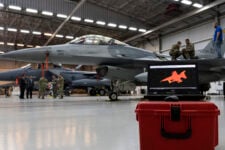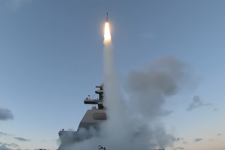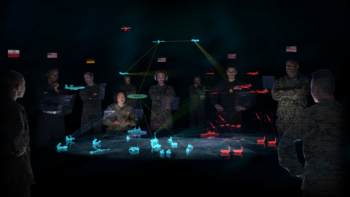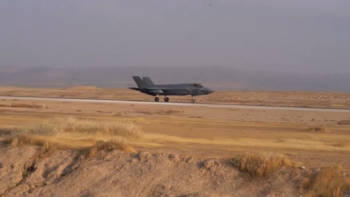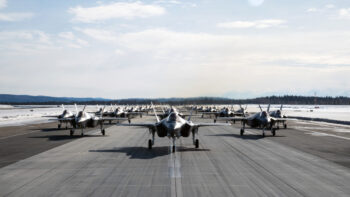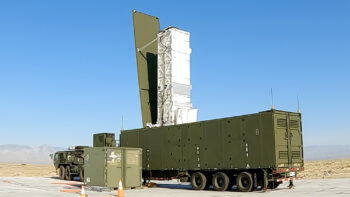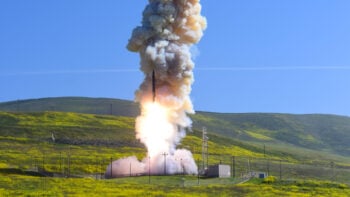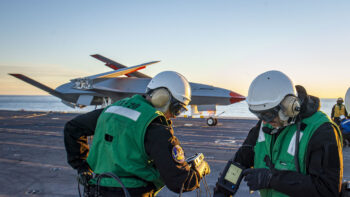UPDATED: Adds DoD Spox Comment
CORRECTED: Ranking Member of HASC StratForces Is Jim Cooper, Not Joe Courtney. Sigh
WASHINGTON: We’ve already got soldiers, sailors, airmen, Marines and Coasties. If President Trump gets what he wants, we may now have spacemen.
“I am hereby directing the Department of Defense and Pentagon to immediately begin the process necessary to establish a space force as the sixth branch of the armed forces. That’s a big statement,” Trump said today at a meeting of the National Space Council. “Gen. Dunford, if you would carry that assignment out, I would be very grateful….Our destiny beyond the Earth is not only a matter of national identity but a matter of national security.”
Joint Chiefs of Staff Chairman Gen. Joe Dunford, of course, cannot carry that assignment out. He can draw up a plan for a new service, but while President Trump unilaterally declared that he wants America to create a Space Force — a service to join the other five — that cannot actually happen unless Congress passes a law to make it so. And the Senate has, so far, resisted calls for the creation of a new service.
Todd Harrison, a defense and space expert at the Center for Strategic and International Studies, said he doubted that Congress could insert Space Force language into the National Defense Authorization Act at this stage of its passage. Such momentous changes typically take years of careful debate and false starts.
Of course, the services and Congress have been debating this issue for much of the last 20 years. We had a Space Command in 1985, but it was folded into Strategic Command in 2002 by then-Defense Secretary Rumsfeld. Since then, space advocates, pilots, intelligence officials and civilian experts have debated whether space should have its own command or its own service or some combination of the two.
For now, if you want a clear idea of how the Air Force is likely to feel, but not say publicly, go no further than Dave Deptula, head of the Air Force Association’s Mitchell Institute:
“The creation of an independent armed space force may be the future of our national security space enterprise, but for now is premature. It is crucial to ensure that any new space force maximize military effectiveness by ensuring space functions are fully integrated into the broader national security enterprise,” he says in an email. “It is not too late to consider a more careful, thoughtful, conditions-based approach to assess if and when an autonomous military space armed force is the best path forward. Congress needs to step up to provide some necessary wisdom by establishing the conditions upon which a new space force should be based.”
Of course, some in Congress, notably Rep. Mike Rogers, head of the HASC strategic forces subcommittee, and his ranking member, Rep. Jim Cooper, have pressed hard for a space force, arguing the Air Force’s pilot-dominated culture pays insufficient attention space, to our peril.
Last year’s National Defense Authorization Act required Deputy Defense Secretary Patrick Shanahan to consider creation of a Space Force, with a final report due at the end of December. The Pentagon is unlikely to move ahead until that study is completed.
While bereft of legal force, Trump‘s declaration today may leave the Air Force incapable of resisting the president’s demands — even though all the relevant senior policymakers from Defense Secretary Jim Mattis to Air Force Secretary Heather Wilson on down say it’s the wrong thing to do at the wrong time.
It may be true, as Deptula argues in his email, that, “segregation of space from today’s Air Force aerospace enterprise risks undermining the synergy of integrated effects in the third dimension that took decades to develop and that currently provide the Nation its warfighting advantage.” But President Trump has made clear again and again that his gut is all he needs to make a decision. And I doubt Trump’s gut has considered “the synergy of integrated effects.”
Among the other issues the president is unlikely to have considered is just how the NRO, an intelligence organization that works very closely with the Air Force, will work with the new service. Will this mean hiving off the large amount of classified space activity the Air Force currently handles and coordinates with the NRO? It depends on how you create the space force. “A big unknown is what you do with the NRO and other agencies that do space things,” Harrison noted when I asked him during a phone call today.
UPDATE BEGINS: After most people had left work, DoD spokeswoman Dana White released this statement, noting the intelligence implications of a Space Force: “We understand the President’s guidance. Our Policy Board will begin working on this issue, which has implications for intelligence operations for the Air Force, Army, Marines and Navy. Working with Congress, this will be a deliberate process with a great deal of input from multiple stakeholders.” The Defense Policy Board reports directly to Mattis. You can be sure board member Wanda Austin, former CEO of the Aerospace Corps, will play a vital role in whatever recommendations the board makes to Mattis. Former Congresswoman Jane Harman, who has long experience with classified space intelligence issues, will doubtless weigh in as well. UPDATE ENDS
And what about the Army and Navy, both of which have space organizations? Will those become part of the Space Force? So many questions and only one big order. My call: it will be 18 to 24 months before we see any kind of meaningful Space Force created, if the Senate can be convinced.
Lockheed wins competition to build next-gen interceptor
The Missile Defense Agency recently accelerated plans to pick a winning vendor, a decision previously planned for next year.


